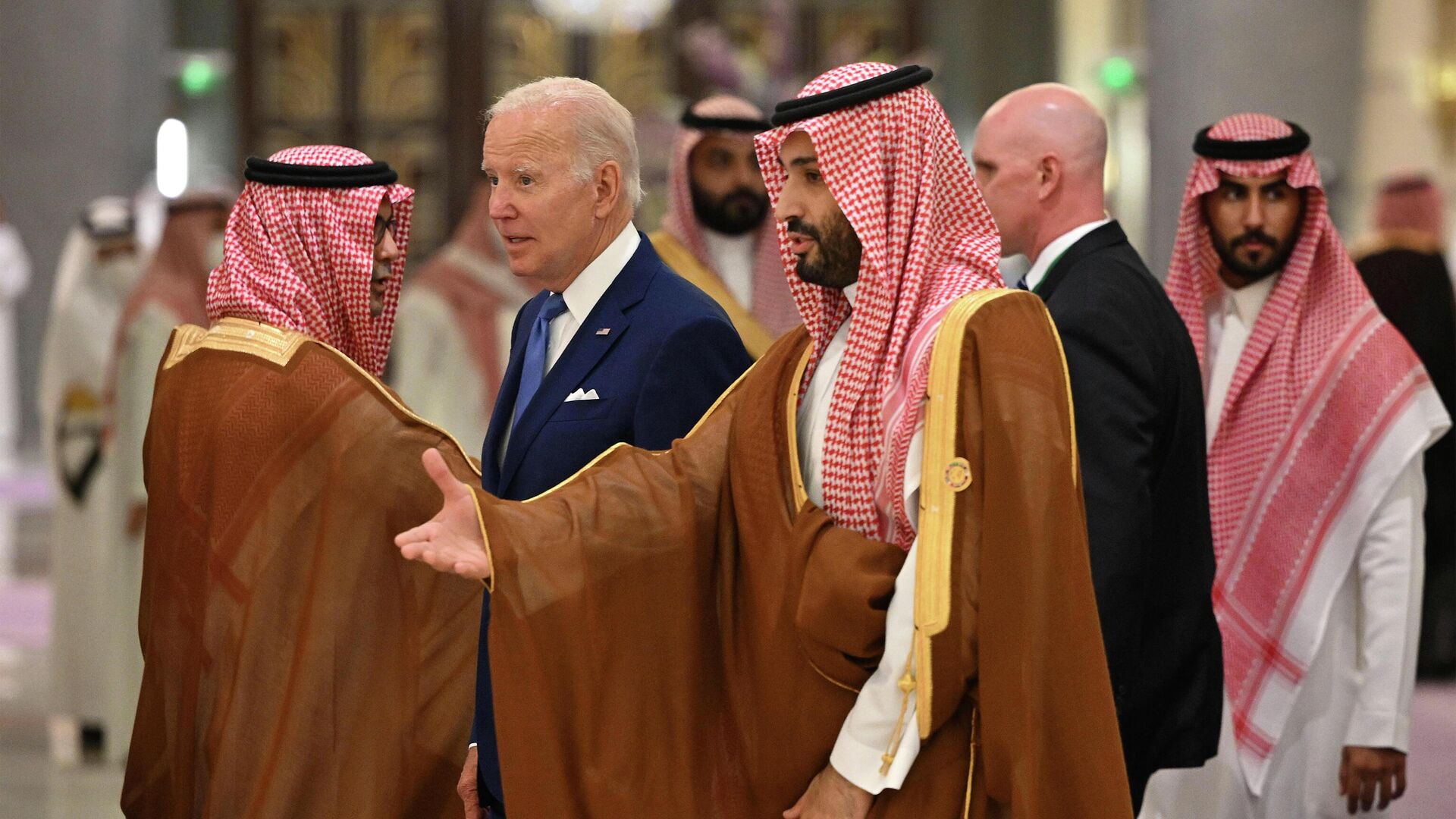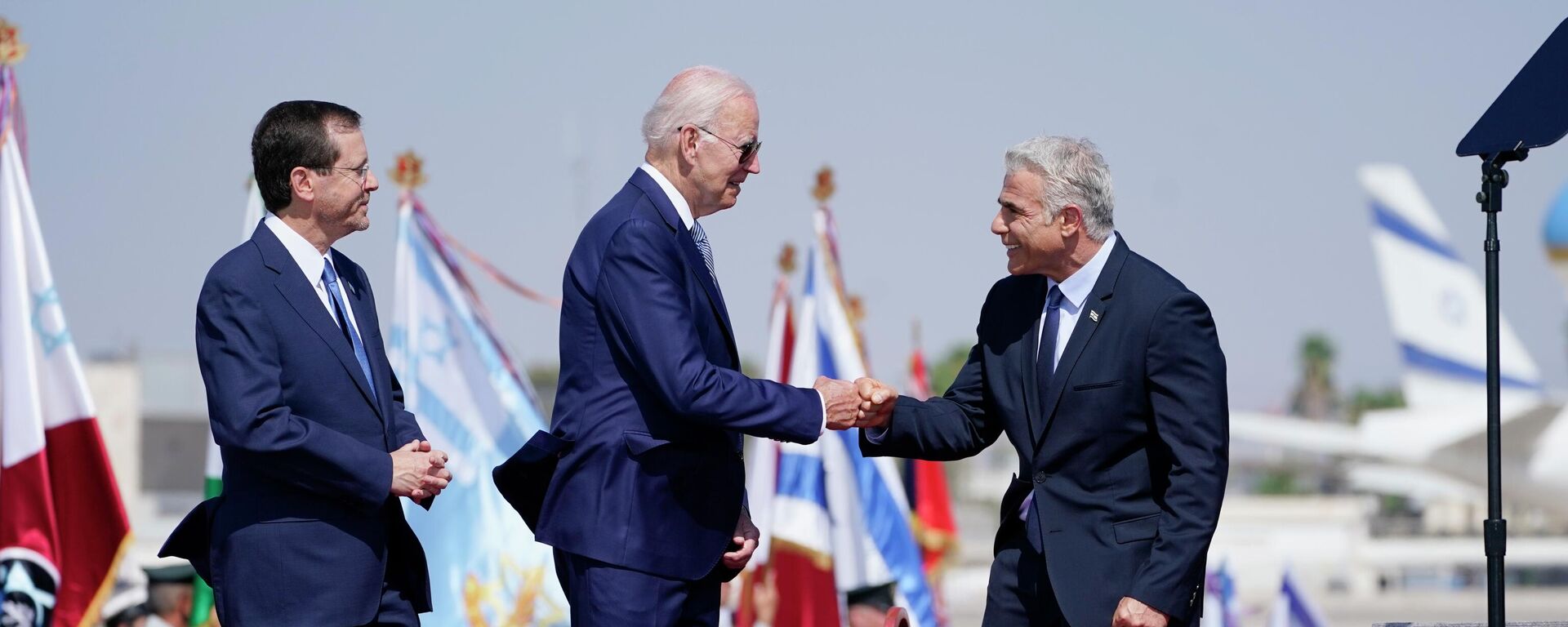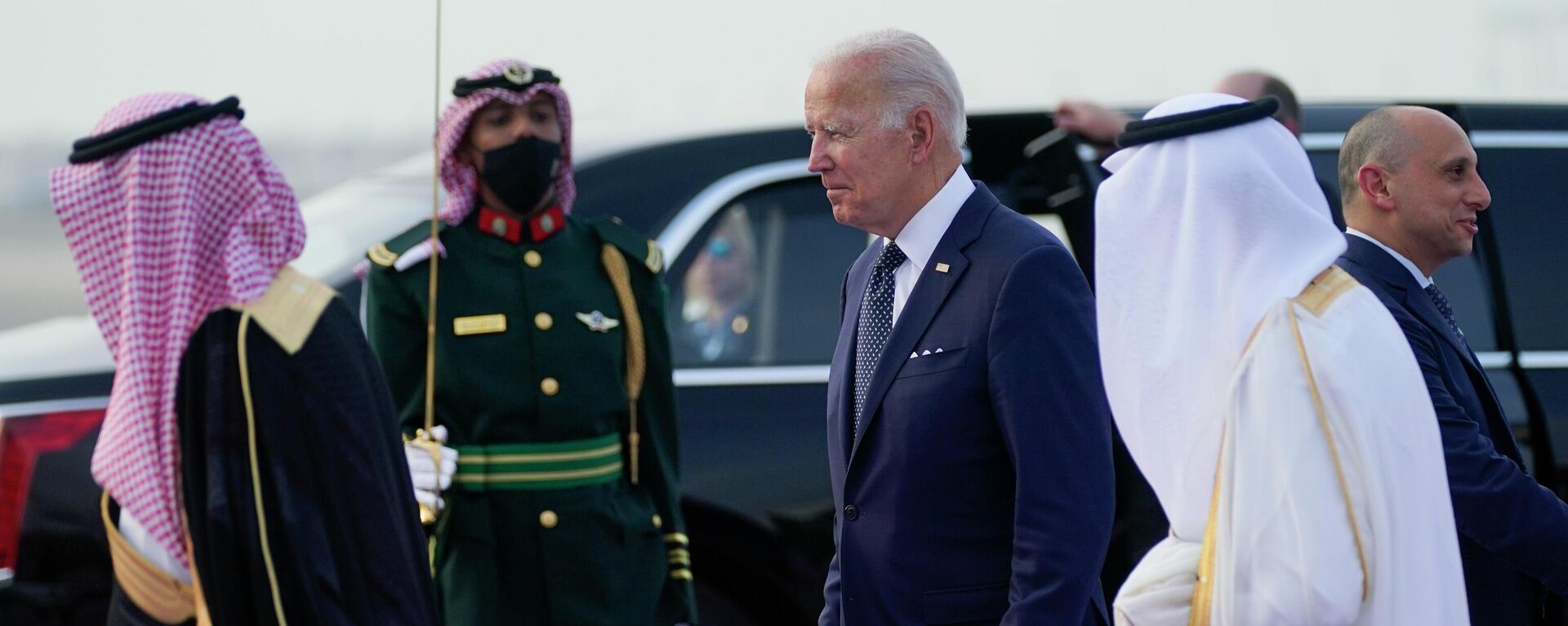https://sputnikglobe.com/20220716/bilateral-ties-defense--energy-key-takeaways-from-bidens-saudi-arabia-visit-1097379804.html
Bilateral Ties, Defense & Energy: Key Takeaways From Biden's Saudi Arabia Visit
Bilateral Ties, Defense & Energy: Key Takeaways From Biden's Saudi Arabia Visit
Sputnik International
US President Joe Biden arrived in Jeddah on July 15 to meet Saudi leaders and discuss a range of issues regarding bilateral cooperation, as well as regional... 16.07.2022, Sputnik International
2022-07-16T14:40+0000
2022-07-16T14:40+0000
2022-07-16T14:40+0000
us
middle east
joe biden
saudi arabia
king salman
https://cdn1.img.sputnikglobe.com/img/07e6/07/10/1097380986_0:0:3073:1728_1920x0_80_0_0_c9bfa9346a68a9ceae98e55c752dbd24.jpg
US President Joe Biden paid a visit to Saudi Arabia in order to further hopes of urging Riyadh to boost its energy production and lower soaring oil prices.The US president met King Salman bin Abdulaziz Al-Saud and Crown Prince Mohammed bin Salman (MBS). The meeting was summed up by the White House in a lengthy Friday communiqué that highlighted the two countries' joint positions on regional security, strategic partnership, climate and energy cooperation. Biden's efforts to persuade Saudi Arabia to boost oil production reportedly brought few results, however.Here is a quick recap of the key points discussed between the two nations.EnergyDespite Washington's hopes that Saudi Arabia would take steps to boost oil cooperation, the communiqué did not include any particular announcements from Riyadh on the matter.The joint statement only said that the US welcomed Saudi Arabia's "commitment to support global oil markets balancing for sustained economic growth."Crown Prince bin Salman said on Saturday that the only thing Riyadh can do is boost oil production from 10 million barrels per day to 13 million. The crown prince outlined that there is no additional capacity beyond that.Bilateral TiesWashington and Riyadh reaffirmed cooperation in the areas of environmental policies, partnership for global infrastructure and investment, security and defense. The two sides particularly agreed to extend business and tourism visas to ten years in order "to facilitate closer people-to-people ties and economic cooperation."The US "commended" the Saudi Green Initiative, praising Riyadh's efforts to achieve net-zero emissions and meet fifty percent of its electrical generation from renewable sources by 2030.The two states also highlighted "the importance of resolving international disputes through peaceful and diplomatic means, and alleviating humanitarian crises through economic and financial support to the region’s countries most in need."SecurityOne of the key issues on the agenda was how Washington and Riyadh need to prevent Iran from acquiring nuclear weapon and "deter" its alleged "interference in the internal affairs of other countries, its support for terrorism through its armed proxies, and its efforts to destabilize the security and stability of the region."The two sides also welcomed the establishment of Task Forces 150 and 153 that "reinforce shared maritime security objectives in the Gulf of Oman and North Arabian Sea" and "focus on the Red Sea’s Bab al-Mandab passageway and further deterring illicit smuggling into Yemen", respectively.The US likewise praised growing cooperation between the Royal Saudi Naval Forces and the US Fifth Fleet’s Task Force 59, praising the expansion of a "cutting edge fleet" that is supposed to support "regional security".Regional IssuesWashington and Riyadh affirmed their commitment for the truce in Yemen, voicing hopes that it would be possible to transform a truce into a "lasting peace agreement".Regarding the Israeli-Palestinian conflict, both sides reaffirmed their support for a two-state solution "wherein a sovereign and contiguous Palestinian state lives side-by-side in peace and security with Israel". In a step towards the normalization of relations between Israel and Saudi Arabia, Riyadh has agreed to allow direct flights from Israel after President Biden was the first to take such a flight.The situation in Ukraine also received a nod in the joint statement, with the two sides once again referring to "a rules-based order" as "the heart of international security". The two also pledged to ensure the unhindered export of grain and wheat products in order to prevent a food crisis.GCC SummitLater on Saturday, at a meeting with the leaders of the GCC countries Saudi Arabia, Kuwait, the United Arab Emirates, Qatar, Bahrain, and Oman, Biden underlined that the US "isn't going anywhere" from Middle East.The 2018 killing of journalist Jamal Khashoggi, who was a vocal critic of the Saudi monarchy, has received little attention during Biden's Saudi Arabia visit. When one of the reporters shouted “Jamal Khashoggi, will you apologize to his family?” neither Biden, nor Crown Prince bin Salman responded.Earlier, after the notorious fist bump with the crown prince, Biden said that he addressed the Khashoggi case with MBS and warned against other attacks on dissidents. However, MBS shot down the US president's assertions and once again denied any responsibility.The 2018 murder occurred when Khashoggi was dismembered in the Saudi Consulate in Istanbul. US intelligence pinned the blame on MBS and the Saudi government. The crown prince, in turn, said he acknowledged a certain extent of responsibility “because it happened under my watch", but denied being directly involved. Saudi Foreign Minister Adel al-Jubeir said that the killing was a “rogue operation”. In late 2019, a Saudi court sentenced five officials to death and gave three others decades-long prison sentences.Biden, for his part, pledged to make Riyadh "a pariah" in 2019 over the murder and the country's overall human rights record. When he became president, Biden refused to get in touch with MBS - until now, amid soaring energy prices and inflation in the US. His change of heart and visit to Saudi Arabia has prompted a wave of criticism at home.
https://sputnikglobe.com/20220715/why-iran-and-saudi-arabia-came-to-forefront-during-biden-lapid-talks-1097360331.html
https://sputnikglobe.com/20220715/joe-biden-doesnt-regret-calling-saudi-arabia-a-pariah-state-after-meeting-with-crown-prince-1097365693.html
saudi arabia
Sputnik International
feedback@sputniknews.com
+74956456601
MIA „Rossiya Segodnya“
2022
Sputnik International
feedback@sputniknews.com
+74956456601
MIA „Rossiya Segodnya“
News
en_EN
Sputnik International
feedback@sputniknews.com
+74956456601
MIA „Rossiya Segodnya“
Sputnik International
feedback@sputniknews.com
+74956456601
MIA „Rossiya Segodnya“
us, middle east, joe biden, saudi arabia, king salman
us, middle east, joe biden, saudi arabia, king salman
Bilateral Ties, Defense & Energy: Key Takeaways From Biden's Saudi Arabia Visit
US President Joe Biden arrived in Jeddah on July 15 to meet Saudi leaders and discuss a range of issues regarding bilateral cooperation, as well as regional security and environmental cooperation.
US President Joe Biden paid a visit to Saudi Arabia in order to further hopes of urging Riyadh to boost its energy production and lower soaring oil prices.
The US president met King Salman bin Abdulaziz Al-Saud and Crown Prince Mohammed bin Salman (MBS). The meeting was summed up by the White House in a lengthy Friday communiqué that highlighted the two countries' joint positions on regional security, strategic partnership, climate and energy cooperation. Biden's efforts to persuade Saudi Arabia to boost oil production reportedly brought few results, however.
Here is a quick recap of the key points discussed between the two nations.
Despite Washington's hopes that Saudi Arabia would take steps to boost oil cooperation, the communiqué did not include any particular announcements from Riyadh on the matter.
The joint statement only said that the US welcomed Saudi Arabia's "commitment to support global oil markets balancing for sustained economic growth."
"Both sides decided to consult regularly on global energy markets in the near- and long-term, as well as work together as strategic partners in climate and energy transition initiatives, recognizing Saudi Arabia’s leading role in the future of energy," the statement added.
Crown Prince bin Salman said on Saturday that the only thing Riyadh can do is boost oil production from 10 million barrels per day to 13 million. The crown prince outlined that there is no additional capacity beyond that.
Washington and Riyadh reaffirmed cooperation in the areas of environmental policies, partnership for global infrastructure and investment, security and defense. The two sides particularly agreed to extend business and tourism visas to ten years in order "to facilitate closer people-to-people ties and economic cooperation."
The US "commended" the Saudi Green Initiative, praising Riyadh's efforts to achieve net-zero emissions and meet fifty percent of its electrical generation from renewable sources by 2030.
The two states also highlighted "the importance of resolving international disputes through peaceful and diplomatic means, and alleviating humanitarian crises through economic and financial support to the region’s countries most in need."
One of the key issues on the agenda was how Washington and Riyadh need to prevent Iran from acquiring nuclear weapon and "deter" its alleged "interference in the internal affairs of other countries, its support for terrorism through its armed proxies, and its efforts to destabilize the security and stability of the region."
The two sides also welcomed the establishment of Task Forces 150 and 153 that "reinforce shared maritime security objectives in the Gulf of Oman and North Arabian Sea" and "focus on the Red Sea’s Bab al-Mandab passageway and further deterring illicit smuggling into Yemen", respectively.
The US likewise praised growing cooperation between the Royal Saudi Naval Forces and the US Fifth Fleet’s Task Force 59, praising the expansion of a "cutting edge fleet" that is supposed to support "regional security".
Washington and Riyadh affirmed their commitment for the truce in Yemen, voicing hopes that it would be possible to transform a truce into a "lasting peace agreement".
"Only a political agreement between the Yemeni parties can durably resolve the conflict and reverse the dire humanitarian crisis," the joint statement read.
Regarding the Israeli-Palestinian conflict, both sides reaffirmed their support for a two-state solution "wherein a sovereign and contiguous Palestinian state lives side-by-side in peace and security with Israel". In a step towards the normalization of relations between Israel and Saudi Arabia, Riyadh has agreed to allow direct flights from Israel after President Biden was the first to take such a flight.
The situation in Ukraine also received a nod in the joint statement, with the two sides once again referring to "a rules-based order" as "the heart of international security". The two also pledged to ensure the unhindered export of grain and wheat products in order to prevent a food crisis.
Later on Saturday, at a meeting with the leaders of the GCC countries Saudi Arabia, Kuwait, the United Arab Emirates, Qatar, Bahrain, and Oman, Biden underlined that the US "isn't going anywhere" from Middle East.
"We will not walk away and leave a vacuum to be filled by China, Russia or Iran," Biden said during the summit.
The 2018 killing of journalist Jamal Khashoggi, who was a vocal critic of the Saudi monarchy, has received little attention during Biden's Saudi Arabia visit. When one of the reporters shouted “Jamal Khashoggi, will you apologize to his family?” neither Biden, nor Crown Prince bin Salman responded.
Earlier, after the notorious fist bump with the crown prince, Biden said that he addressed the Khashoggi case with MBS and warned against other attacks on dissidents. However, MBS shot down the US president's assertions and once again denied any responsibility.
The 2018 murder occurred when Khashoggi was dismembered in the Saudi Consulate in Istanbul. US intelligence pinned the blame on MBS and the Saudi government. The crown prince, in turn, said he acknowledged a certain extent of responsibility “because it happened under my watch", but denied being directly involved. Saudi Foreign Minister Adel al-Jubeir said that the killing was a “rogue operation”. In late 2019, a Saudi court sentenced five officials to death and gave three others decades-long prison sentences.
Biden, for his part, pledged to make Riyadh "a pariah" in 2019 over the murder and the country's overall human rights record. When he became president, Biden refused to get in touch with MBS - until now, amid soaring energy prices and inflation in the US. His change of heart and visit to Saudi Arabia has prompted a wave of criticism at home.



